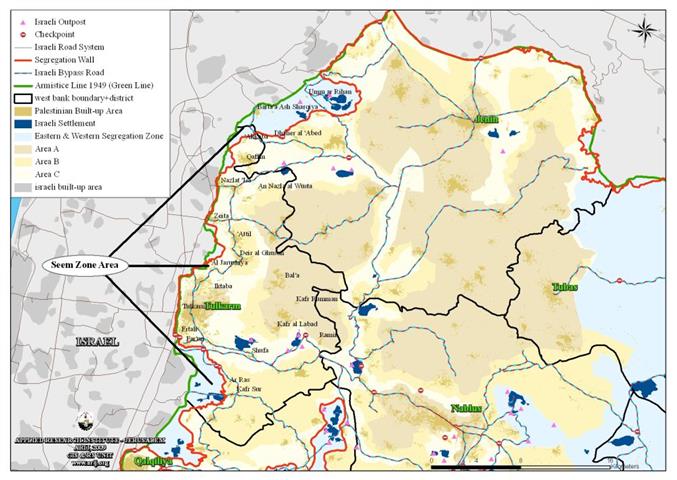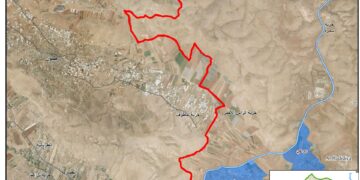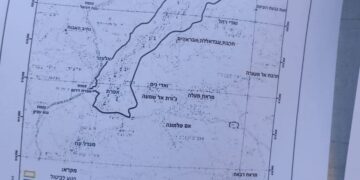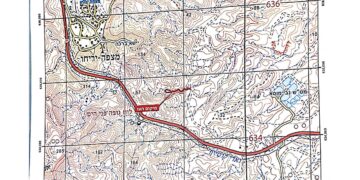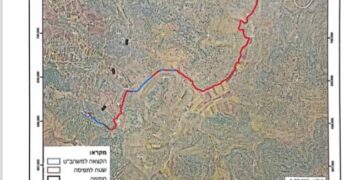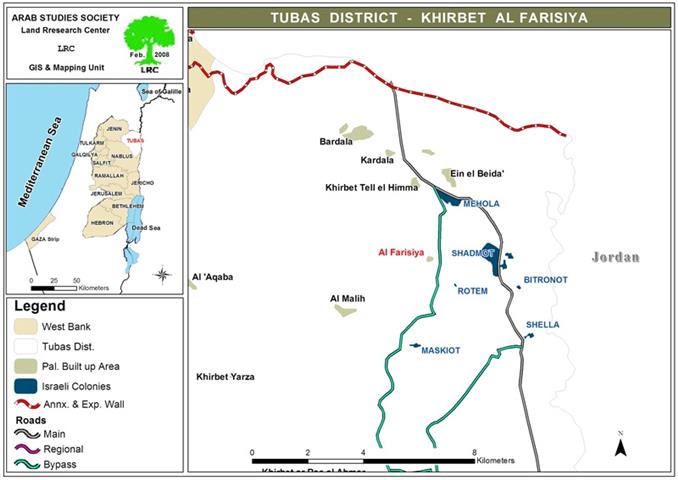The Israeli Army issued a military order renewing its land grab policy under “establishing security buffer zone” at the northern cities of the West-Bank districts of Jenin, Tulkarm and Qalqiliya. The Israeli military order holding number 03/02/S was originally signed and issued back on October 2, 2003 has actually got a previous extension for the first time back on December 27, 2005, and the current third extension now comes with the end of the legal term of the second extension, and continues according to the military order issued about the new term extension until December 31, 2011. (See Picture # 1 below of affected areas)
Map 1: affected areas by the military order
The pretext according to the military order is to have a security buffer zone area. Consequently, thousands of Palestinians agricultural lands are isolated behind that Security buffer zone, which is in fact protected by the Segregation Wall. Palestinian farmers with permits issued from the Israeli civil administration are (able) to access their land through an Israeli controlled gates fixed along the path of the Segregation Wall. The lands isolated are classified as Area 'C' and the bulk of which are agricultural lands, mostly planted with olive trees. Since the Israeli isolated the lands with the military order of 2003, the Palestinian farmers were constantly harassed while attempting to cross the agricultural gates.
The policy of land grab that has been implemented by the Israeli occupying administration was declared after occupying the West-Bank cites and Gaza in 1967, the Israeli occupational administration claimed always that it's intentions on those military orders were strictly and solo for security reasons. However, the Israelis claims were rapidly refuted by issuing building tenders for new settlements or internal racial roads within the occupied territories by the occupying administrations.
The adopted Israeli logic for building the Segregation Wall in occupied West Bank is no longer valid even though the Israeli intentions were proclaimed on security needs. The security argument has lost its girders as soon as Israel started building the Segregation Wall away from the Armistice Line of 1949, which constitutes the internationally recognized boundary for the State of Israel.
even though Israel did not officially annex the area that falls between the Segregation Wall and the Armistice Line, the access to that same area is no longer permissible to the residents of the West Bank unless an Israeli authenticated documents of ownership to the lands is presented to the Israeli civil administration in order to grant the owner a temporary permit (set by a certain period and time) to enter the land.
This clearly indicates Israel's determination to continue its occupation of these lands under any future peace treaty with the Palestinians and to solidify the Segregation Wall and make it permanent, in contradiction with the Israeli government's claims that the Wall is temporary.
The ICJ 'advisory ruling' stamped the Segregation Wall illegal and demanded Israel to dismantle it. Accordingly, all actions and constructions facilitating the existents of the wall would be also considered illegal and should be removed accordingly. The ruling also called upon the international community to act more strictly against the segregation wall and not to recognize it in any manner. This Israeli declared buffer zone in the Israeli military order is simultaneously considered illegal under international law.
To Conclude:
The continues Israeli policy of creating de-facto realties on the ground and the denial of all international human laws and rules and the racism acts taken by the occupying state, could only be interpreted as a clear message to the international community of Israel’s lack of interest for peace with the Palestinians unless this peace is fabricated in a manner that allows Israel to maintain all the land it want with minimum; preferably without Palestinians.
Prepared by:
The Applied Research Institute – Jerusalem


